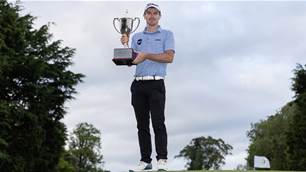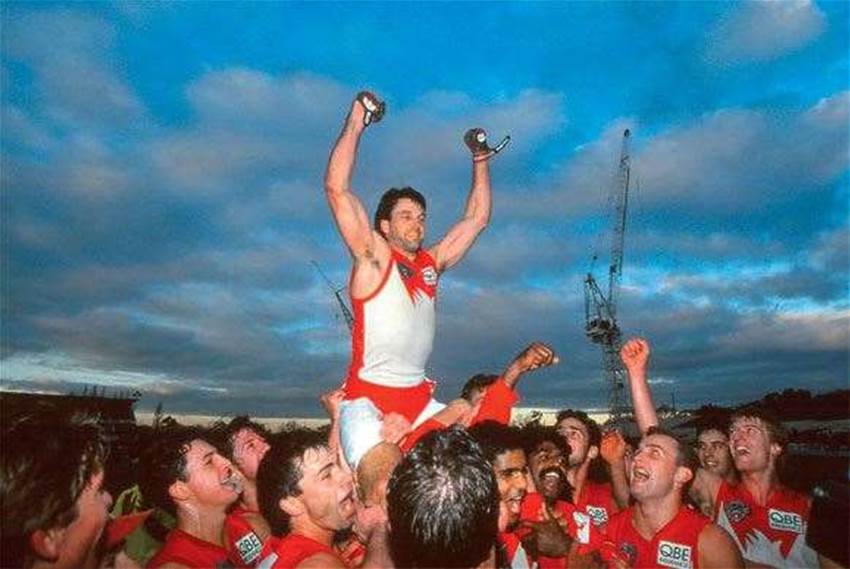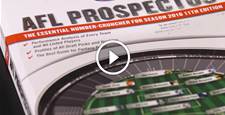Fear, loathing, greed and optimism in the AFL – these are things Paul Roos has seen before.
Fear, loathing, greed and optimism in the AFL – these are things Paul Roos has seen before.
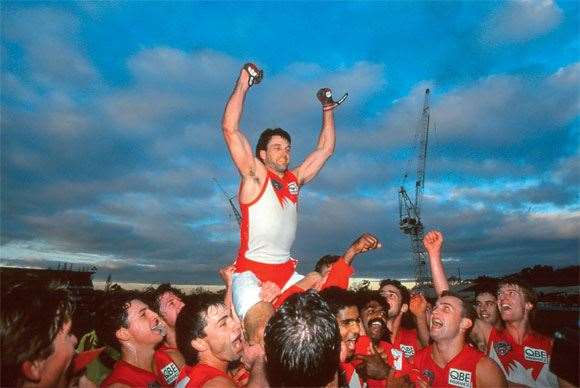 Roosy celebrates game no. 300 on Swans shoulders in 2001
Roosy celebrates game no. 300 on Swans shoulders in 2001Image: Getty Images
These are blustery times for the AFL. Beachheads in western Sydney and on the Gold Coast, Israel Folau and Karmichael Hunt jumping codes for untold money, established AFL stars bitter at these unprecedented contracts, old clubs terrified at the concessions granted these newcomers. Fear, loathing, greed and optimism in the AFL – these are things Paul Roos has seen before.
He’s lived the game in the suburban heartlands – 269 appearances for Fitzroy attest to that. And he’s lived the game on the barren frontier – 87 games for the Swans and eight years as head coach in Sydney attest to that. He’s experienced years of plenty and years of famine. As a player he’s finished at the foot of the table and he’s lost a grand final, as a coach he’s won a grand final and lost another. And at the end of this season, he’ll hand in his clipboard – leaving the AFL a poorer place. So while Roos is still here, pull it in tight and bend an ear to one of the most considered and articulate voices in footbal
Perhaps a little premature, but congratulations on a fine stint at Sydney. Will you look back on your Swans years with fondness?
I will – when this season finishes. When I get a chance to reflect on things, I think I’ll see that what we’ve been able to achieve here has been a really special time in the club’s history.
You’ve always said you’re “not a career coach”. Why?
Well, as a player I always found it hard when a coach had been with the same group for a long time. I’ve always felt there was a lifespan for a coach at one club, and I’ve always seen myself as a one-club coach – so the only outcome when you put those two things together is that I won’t coach for 15 years. Not everyone’s Kevin Sheedy – he was extraordinary in his ability to reinvent himself with a group of players, to outlast one generation and take on another. That’s very, very rare for a coach; Kevin had a unique talent. I always thought seven to eight years was a good period for me, after that I might get tired, the players might get tired of me. As it’s turned out, this year’s been my eighth …
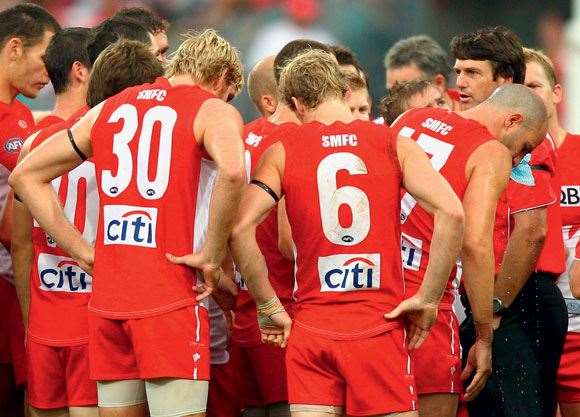 When Roos brings the Swans in close, his charges listen up – always have
When Roos brings the Swans in close, his charges listen up – always haveImage: Getty Images
You don’t appear tired. And the players certainly don’t seem tired of you …
I guess that’s why I’m hoping to leave at the right time …
As a player you were coached by some big names – Barassi, Parkin, Wall, Eade. Any favourites?
I’ve enjoyed all of them to be honest. Personally, one of the most important things has been having a lot of coaches. They were all so different. Tactically, Rodney Eade was fascinating, how he used his players. Certainly Rodney and Robert Shaw were the most tactical coaches I played under. David Parkin was just so thorough in his preparation, so it was very instructive to watch him go about his business. Wallsy really changed the game with his kick-ins, so he had a very innovative mind. Not many coaches can say they actually changed the game, but Wallsy had the huddle going at centre half-back and then we’d kick wide – that’s why they brought in the zones. And then, of course, Barassi just had a great aura about him. Everything he said, you listened to – some of it was a bit left-field, but it was always interesting.
As a coach what do you see as your main strengths?
I think honesty. We’re very honest with our players here. They’re very comfortable coming to the coaching group – not necessarily to me, because I think the coach needs to maintain a certain aura – and I think we’ve set up a system where the players can have a real say in their footy club, from the oldest to the youngest. I think that empowerment, that ability to have a real impact on their club, is something they’ve enjoyed.
You’ve also spent time in America studying their sports. Learn anything there?
Yeah, I had a chance to go over there when I retired in ‘99 and I went to the Chicago Bulls, the Chicago Bears, the 49ers, the Denver Broncos. I was just struck by how professional they were, how specific their training was compared to what we were doing back here. It was real game-state training, game-related stuff, whereas back here it was just a bit of kick-to-kick and circle work. That was a big thing I brought back.
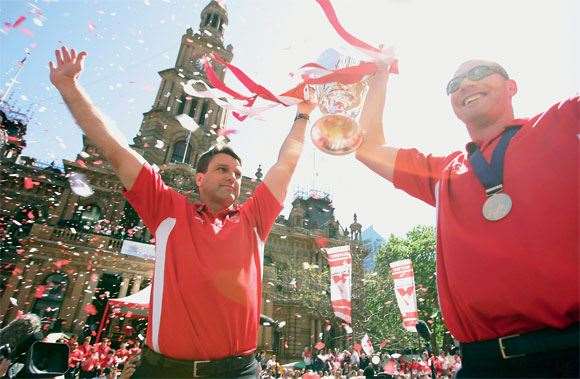 Roos with Barry Hall – no Plugger, but equal in value in the spirit stake
Roos with Barry Hall – no Plugger, but equal in value in the spirit stakeImage: Getty Images
With Greater Western Sydney setting up shop across town, do you worry this is a bad time to leave the Swans?
Look, hopefully the club sees a role for me in the future. I certainly don’t want to be seen to be abandoning the club. While I’m not senior coach, my allegiance is very much with this club. So I’ll definitely be discussing some sort of role with our CEO Andrew Ireland because I do think it’s a very important time for this footy club.
GWS – will it work?
I think it’ll work because the AFL’s saying it’ll work. They’ll pump millions and millions and millions of dollars into this. But what does work mean? You know, we’ve been here for 29 years and we won the flag in ’05. But how do you define success? When is a club deemed as successful? That’s the main question.Look at the Swans. We’ve had two runs of success. There was the Edelsten era, back in ’86 and ‘87, when they bought some good players. But the real foundation of this club came when it was restructured, when the AFL mutually took the club back from the private owners and made it a membership-based club. Then, of course, Tony Lockett came up and that was another turning point. To get Plugger up here – that generated enormous interest which only grew with that grand final appearance in ‘96. I think that was the moment the Swans really arrived. And that period carried through to the flag in ‘05. So we had that period of success from ‘86 through to ‘88, but in a real sense the success didn’t arrive till Tony Lockett got here.
So it took Sydney 15 years to establish itself. Is this the sort of time frame GWS should be looking at?
I think so. And listening to Andrew Demetriou and David Holmes and those guys, I think they realise that this will have to be a generational thing. It’s not going to happen in four or five years. That’s not saying the club won’t win games. But in terms of being accepted and being well-known in the community, in terms of becoming a stand-alone entity, not reliant on AFL money, that’s going to take a lot of time. You’re looking at 10, 15, maybe even 20 years.
Is a team in western Sydney necessary?
Well, it’d be interesting to ask a lot of people around Sydney and New South Wales. But the AFL has deemed it necessary based on where the competition’s going, TV rights, things like that. So it’s probably not for me to say whether it’s necessary. But you can certainly take a view, being here in Sydney, that the Swans are still building as a brand ...
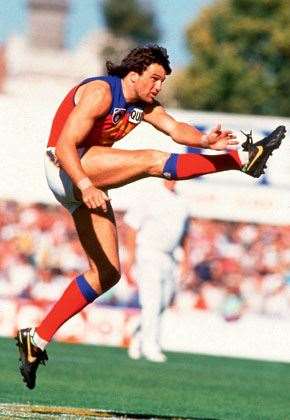 Paul Roos the 269-time Fitzroy Lion.
Paul Roos the 269-time Fitzroy Lion.Image: Getty Images
This current obsession with expansion, flags on the map – is this for the good of the game, or is it just to line pockets of the suits in head office?
Well, one of the things I find frustrating – and I’m not sure that this is necessarily driven by the AFL – is this notion of a battle of the codes. I don’t think it’s good for sport in general. You know, I’ve lived in Sydney for a long time now and I have enormous respect for the other codes. At the Swans we’ve got the Roosters next door and I’ll often see
Brian Smith at lunch. I catch up with Ricky Stuart occasionally; I met Robbie Deans the other day; I consider David Gallop a friend. I think the ability to co-exist is one of the great things the Swans have achieved. It’s been a real positive for us as a football club – we’ve never been seen trying to poach any NRL followers. If they want to come watch us on Saturday arvo then watch their NRL team that night, great. So that’s where I’m most uncomfortable, when it becomes AFL vs NRL vs soccer. I mean, we’re all going to be here. Let’s be perfectly frank, no one’s going anywhere. If the AFL thinks rugby league’s going to disappear, I’ve lived in Sydney long enough to tell them that ain’t going to happen.
Has that policy of co-existence always been in the Swans’ mission statement?
I think it just comes with experience; it’s something you understand gradually. You know, everyone comes in with all guns blazing, thinking they’re going to take over the world. But you hit a point, and this has certainly happened at the Swans, where you realise that you’re just here to be a football club, a successful club, and if league or union or
soccer people want to come and follow, fantastic. But that’s got to be a result of being a good organisation, not critically attacking anyone, or poaching anyone.
And so to Karmichael Hunt and Israel Folau! Can they become AFL-standard players?
Well, that’s ultimately what everyone will judge this whole experiment on. Obviously there are a lot of levels to this thing – you’ve got the player, the player manager, the club, the opportunities – so I don’t think you can begrudge Folau or Hunt for doing this. Can they be successful? Look, it’s going to be difficult, very difficult.
But surely …
Well, broaden the question, don’t just focus on Israel and Karmichael – can any rugby league player play AFL football? Difficult. Very difficult. In AFL there’s 15 to 18 kays of running, there’s 360-degree tackling, there’s hand-balling – these skills aren’t in rugby league.
Hopefully they get some sort of a grace period where they’re allowed to develop into the game. That might not happen because of the salaries they’re on. But I don’t think we’re going to know until the last years of their contracts whether it’s worked. So my hope in all this is that people don’t jump down their throats and do give them time to develop.
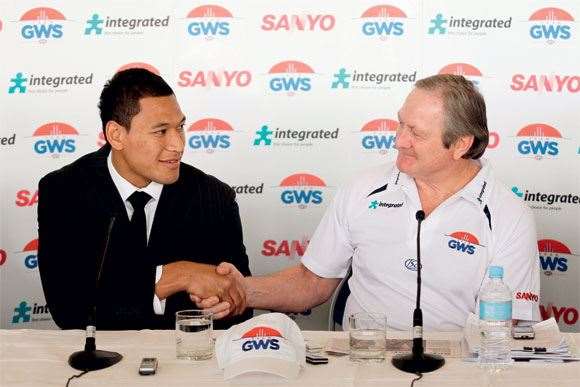 Israel Folau’s skills in pulling a crowd is what Sheedy’s GWS paid for.
Israel Folau’s skills in pulling a crowd is what Sheedy’s GWS paid for.Image: Getty Images
Getting into the technical nitty gritty, how would you go about developing them into AFL footballers?
Well, we had Mike Pyke, so I’ll use him as an example. The first thing we did with him was look at a tape of him playing. And, yeah, we saw his raw athleticism, saw him scoring that try against the All Blacks, so we made a few enquiries and discovered that, yes, he had kicked the ball a bit. That’s when we brought him over here.
The first thing we did then was test him. How good was his kicking? Not too bad, we could work on that. He was six foot seven, so we knew he was going to be a ruckman. After that we thought we’d better see how he could run. So we put him on a three-kay time trial. And to be perfectly frank, if he’d run 13 minutes, we wouldn’t have brought him back. So to answer your question, if they can’t run, their chances of playing AFL football are zero. If they can’t get fit, it doesn’t matter how good a mark they are. That’s stage one. After that you work on their pure skills – stationary kicking, basic handballing, building it up, as often as you can, repetitive, repetitive, repetitive. Only then do you translate that into a game. And even then a lot of the stuff they’re only going to learn from playing.
You mention that 360-degree scope of AFL – surely that alone would take thousands of hours of game time to become adjusted to?
Well, that’s where you need to know what other sports they’ve played. If you’ve purely played rugby league since you were 11, then yes, it would be very difficult. But with Pikey, for example, he’d been a very good basketballer in his younger days, and that’s a 360-degree game that demands good decision-making. There’re a lot of very good basketballers playing AFL footy.
Look, we’ve seen Pikey build up to a very good level of football, but as a ruckman he’s only getting the ball seven to eight times a game. Hunt and Folau aren’t going to be ruckmen. They’re going to be asked to use the ball a lot more, be a lot smarter in their decision-making.
Have you heard any grumbling from the Swans’ players about the money Hunt and Folau are on?
Clearly, if the numbers we’re hearing are correct, then the salaries are exorbitant for their talent levels. But the advantage the Swans’ players have is an understanding of what GWS is trying to achieve in terms of marketing. I think our players realise that if the contract is, say, a million dollars, maybe 200,000 is for playing and the
rest is for marketing. I haven’t asked the boys if they’re happy or unhappy with the numbers, but I think they do understand the reality of where the dollars are coming from and going to.
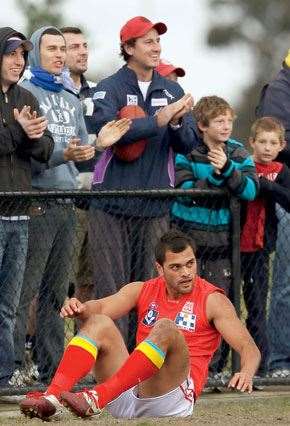 Karmichael Hunt will be knocked down, but he’ll get up again ... he has to.
Karmichael Hunt will be knocked down, but he’ll get up again ... he has to.Image: Getty Images
You mention marketing. Is Folau playing Sydney Premier Division footy really going to win hearts and minds out west?Look, I don’t know what their strategies are going to be, but I suspect you’ll see Israel plastered across billboards everywhere, you’ll see him on T-shirts, on posters, on paraphernalia. I mean, you could pay Gary Ablett Jr a million bucks to play out there, but no one would have a clue what he looks like. You’d get enormous onfield impact from Gary, and that would translate to winning games and getting bums on seats. The view with Folau is just get someone who’s recognised. Will it succeed? Well, that’s not going to be known for at least four years. And even if he doesn’t play a game, some marketing guy will come out and say “look, we’ve generated X number of dollars” and all that ...Do you think such enormous salaries would create disharmony within a club?
I’m not sure. As a player, I played with guys who got more money than me, I played with guys who got less, and it was never really an issue for me. You know, Sydney has a history of bringing up guys from Melbourne, and when myself and Tony Lockett came up I’m assuming we were on more money than someone like Paul Kelly. Now, I don’t know that for a fact, but my point is this: it’s happened before where less talented players
get more money than more talented players. Ultimately, you worry about what you’re getting paid and, yes, you might be aware someone’s on more, and you might be disappointed by that, but it doesn’t carry over to the locker room.
At the end of the day, most players, even the ones coming out and saying these contracts are ridiculous, wouldn’t have a problem playing with Hunt or Folau. So I don’t think it’ll impact the clubs internally. Look at those blokes who play with Karmichael on the weekend. Most of those guys are probably earning
no more than 20 grand a year, but they were still
rapt when he kicked his
first goal.
Given these club dynamics, how would you deal with the presence of a Hunt or a Folau at the Swans?
If we had that situation here, we’d sit the leadership group down and say, “Look boys, we want to make this clear. These are the reasons why we’re bringing this guy here … ” We wouldn’t tell them his contract, but we’d make it clear to them that he wasn’t getting paid a million bucks to play AFL footy. I don’t know what detail you’d goingto, but you certainly owe it to them to explain the situation. And you owe it to them to ask their opinion. And if they said
no, they didn’t want him at the club, then we wouldn’t take him.
Can you see a time when the Swans are primarily stocked with local talent?
Well, I think a watershed moment for us was the introduction of our academy. We’ve been pushing that with the AFL for many years and it’s pivotal that we give Sydney kids an incentive to stick with AFL footy, to give them a training base. So having that academy is a huge step forward for this club. We can now go to youngsters and say, “Look, there is a direct pathway to the Swans.” It also means we can have a significant say in their development from the time they’re ten, right up to their draft day. So I think it’ll have a huge bearing on how many Sydney kids play for the Swans.
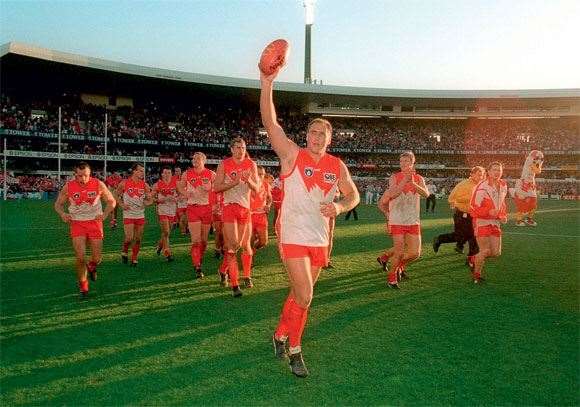 Tony Lockett is the one who really kicked off the Swans’ success.
Tony Lockett is the one who really kicked off the Swans’ success.Image: Getty Images
Let’s get to some of your memories. What’s the funniest thing you’ve seen on the paddock?
Ummm. Well, I actually kissed one of my good mates – Tony McGuinness – on the boundary line one day. I tackled him and we both rolled over the boundary line, and he started having a bit of a whinge, so I planted a kiss on his cheek.
Did he enjoy it?
Wouldn’t say he enjoyed it at the time …
At their peak: Hall or Lockett?
Oh, both have done enormously well for this club. No disrespect to Hally, but Lockett, with 1300 goals, is arguably the best player to ever play the game. I think Hally would happily acknowledge that. But you could definitely say that while Barry was here, his contribution was equal to Lockett’s, even though he never kicked his hundred goals. If you compare their legacies at this football club, I think they’d be comparable.
Your no dickheads policy – can you name any blokes who slipped through the net?
Well, it’s funny, I think our recruiting bloke chucked up the no dickheads policy. I sometimes joke that we take dickheads who are talented, we just don’t take untalented dickheads ...
Does it still hurt to see no Fitzroy in the comp?
Oh mate, I’m pretty realistic. I think what Brisbane’s done has been really good. I remember at Fitzroy back in ‘86 the club president at the time pulled us all together and said, “We’re broke, we’ve either got to merge with someone or go to Brisbane.” And the player group all voted to go to Brisbane so we could stay together. And that’s probably my only regret from my time at Fitzroy: I wished we’d gone at the end of ‘86, because I reckon we would’ve had a really successful period. There were some players drafted to Brisbane who probably would have gone, good players who never went. I always thought Brisbane was the best option. You know, if I ever live in Brisbane or Melbourne again, I’d take my boys to a Brisbane game and say, “Look, this is my old club.” I’ll always say that. I’ve got two clubs – one’s Sydney, the other’s the Brisbane Lions.
– Aaron Scott
Related Articles
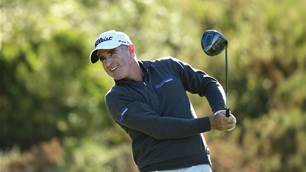
Video interview: Drinks With ... Matt Millar
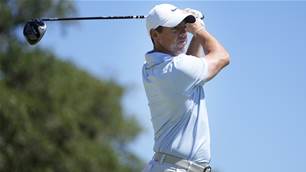
McIlroy turns to Butch Harmon ahead of Augusta berth
